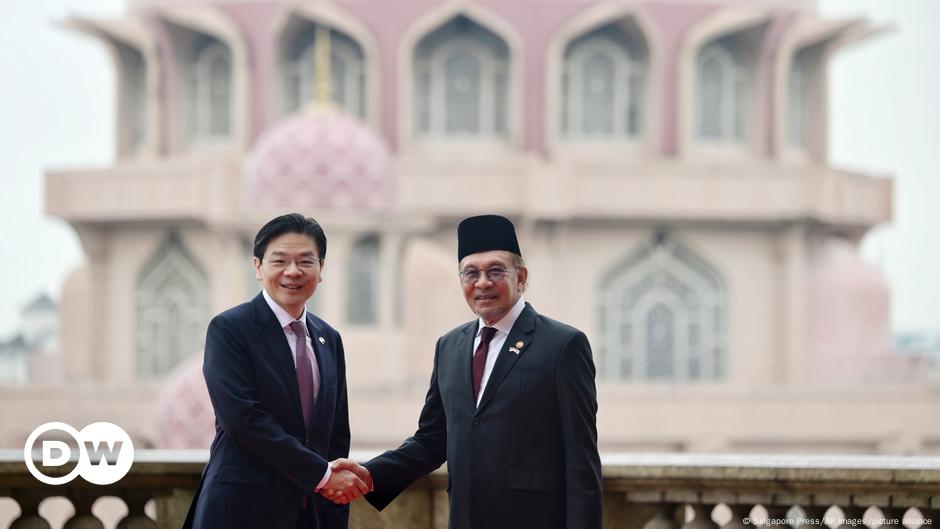Malaysia and Singapore last week signed an agreement to establish the Johor-Singapore Special Economic Zone (JS-SEZ) in Malaysia’s southernmost Johor state, just north of Singapore.
The initiative is designed to attract global investment and ease the cross-border flow of goods and people between the two countries, while leveraging the strengths of both to deepen economic ties.
Johor, Malaysia’s second most populous state, plays a significant role in the country’s economy, with major sectors including manufacturing and tourism.
JS-SEZ proposals include a passport-free immigration clearance system, cooperation on renewable energy and simplified business approvals.
Leaders of Singapore and Malaysia praised the project
Singapore Prime Minister Lawrence Wong said that the JS-SEZ will create good jobs for citizens of both countries and attract significant international investment.
He said, “Both parties have actively engaged stakeholders to ensure that the JS-SEZ has the conditions to help our business grow together for the long term. This will attract new investment globally.” It’s about both sides working together to attract projects.”
Malaysian Prime Minister Anwar Ibrahim said the project created a “unique initiative” for both countries to harness each other’s strengths and deepen ties in an increasingly polarized world.
The two leaders also invited proposals for a high-speed rail connection between the two countries, which should be led by the private sector with limited government involvement. The previous plan was canceled in 2021 due to disagreements.
Johor Chief Minister ONN Hafiz Ghazi stressed the importance of taking advantage of the opportunities presented by the new agreement. He stressed that the benefits of the JS SEZ will extend beyond the state capital Johor Bahru to the entire state and contribute to Malaysia’s broader economic and tourism sectors.
“The main question is whether we, the people of Johor, are ready to embrace the opportunities that will transform the economy, because if we are not ready, others will take advantage,” he told DW. “Malaysia as a whole will benefit from various sectors such as the economy, tourism and others.”
Johor, an attractive tourist destination
Johor has long had several important tourist attractions, including Legoland, Desaru and Johor Zoo.
More than 16 million foreign tourists visited Johor in 2023. Government officials forecast 20 million as the target for the whole of 2024.
Muhammad Abdul Khalid, research fellow at the Institute of Malaysian and International Studies at the National University of Malaysia, said the JS-SEZ builds on “Iskandar Malaysia”, the country’s first economic zone and Johor’s main economic corridor, which was launched in 2006. Had gone. ,
“The JS SEZ is much larger, it includes Iskandar and also includes the failed and stalled Forest City project,” he told DW.
Forest City’s Chinese developers envisioned it as housing 700,000 people, but it has since been dubbed a ghost town, with less than a quarter of the city completed.
What role can China play?
Ian Chong, a Singaporean political scientist, said the JS-SEZ takes advantage of the strengths of both countries, promoting closer ties and mutual benefit.
“It brings the two countries closer,” he told DW. “If things work well, both Malaysia and Singapore will benefit.”
Chong stressed the need to diversify long-term foreign direct investment (FDI) strategies, noting that although China can contribute, its role may be constrained by internal economic challenges.
“In the long term, this should be diversified, especially from developed countries – which have generally been and will remain the largest sources of FDI in ASEAN. China can be a source of FDI, but due to their domestic economic headwinds and “Given debt they may be a more limited source of FDI,” he said.
“In the short term, FDI into Southeast Asia, including Malaysia, has been the beneficiary of many companies’ ‘China plus one’ strategies,” he said, referring to the global scheme where companies diversify by relocating some of their supply chains. . “China’s production for other promising emerging markets.”
“However, these benefits come from major powers accommodating small and medium powers working with their rivals. Should there be less tolerance for working with major rivals, FDI may face some limitations – at least in the short to medium term,” Chong said.
potential political reaction
Khalid cautioned that the JS-SEZ would bring political challenges, particularly with regard to Singapore’s influence on Johor and cross-border labor movements.
“The government must ensure that there is no risk of ‘gentrification’ in Johor, otherwise it could lead to a political backlash,” he said.
Khalid suggested that the Malaysian government should also consider the wider implications of the JS SEZ.
“Concentrating economic activity and offering overly favorable tax incentives within a region may divert investment from other regions, increasing regional disparities,” he said.
“Perceptions of economic colonization by Singapore may arise if the Government fails to effectively address these concerns and ensure that the benefits of SEZs are shared equitably across the country.”
Edited by: Keith Walker





Leave a Reply